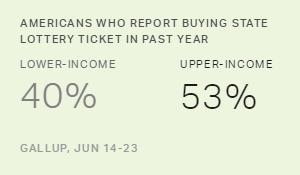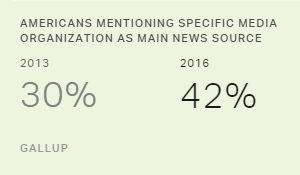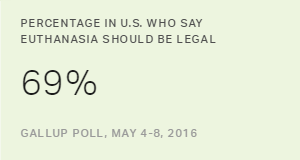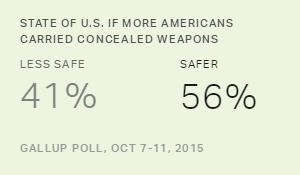Story Highlights
- Nearly half of all U.S. adults say they have played the state lottery
- 40% of lower-income Americans have bought a lottery ticket
- 11% of the lower-income say they sometimes gamble more than they should
WASHINGTON, D.C. -- Roughly half of Americans say they have bought a state lottery ticket within the last year, similar to the figures recorded in 2003 and 2007, but down considerably from the 57% who said they played the state lottery in 1996 and 1999. This trend has occurred even as the number of states with lotteries grew over this period from 37 states and the District of Columbia to 44.
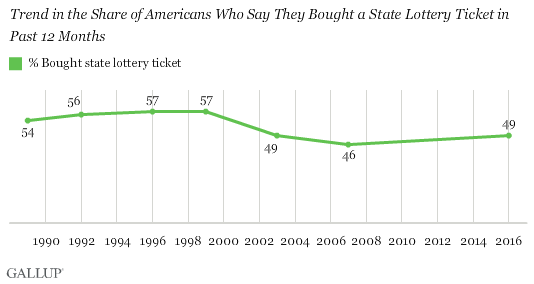
These latest data are from a Gallup survey conducted June 14-23. The exact reason for the decline in Americans' reports of playing the lottery during the last 13 years is not clear, although gamblers now also have a wider range of gambling avenues from which to choose, including the proliferation of online poker and online fantasy sports leagues.
Poorer, Less Educated Less Likely to Say They Bought State Lottery Ticket
Critics of state-sponsored lotteries argue that they disproportionately prey on the hopes of disadvantaged groups such as the poor and less educated, who can least afford to be spending on non-essentials. According to some lottery critics, lottery winnings can have an outsized appeal to economically vulnerable Americans who have less disposable income.
The latest Gallup update, however, shows that Americans whose annual household income is less than $36,000 per year were substantially less likely than higher-income Americans to say they have purchased a state lottery ticket within the past year. Four in 10 lower-income Americans say they bought a lottery ticket during that time, while more than half of middle- (56%) and upper-income Americans (53%) say the same.
| Less than $36,000 | $36,000 to $89,999 | $90,000+ | |||||||||||||||||||||||||||||||||||||||||||||||||||||||||||||||||||||||||||||||||||||||||||||||||
|---|---|---|---|---|---|---|---|---|---|---|---|---|---|---|---|---|---|---|---|---|---|---|---|---|---|---|---|---|---|---|---|---|---|---|---|---|---|---|---|---|---|---|---|---|---|---|---|---|---|---|---|---|---|---|---|---|---|---|---|---|---|---|---|---|---|---|---|---|---|---|---|---|---|---|---|---|---|---|---|---|---|---|---|---|---|---|---|---|---|---|---|---|---|---|---|---|---|---|---|
| % | % | % | |||||||||||||||||||||||||||||||||||||||||||||||||||||||||||||||||||||||||||||||||||||||||||||||||
| Bought state lottery ticket in past 12 months | 40 | 56 | 53 | ||||||||||||||||||||||||||||||||||||||||||||||||||||||||||||||||||||||||||||||||||||||||||||||||
| Gallup, June 14-23, 2016 | |||||||||||||||||||||||||||||||||||||||||||||||||||||||||||||||||||||||||||||||||||||||||||||||||||
| High school or less | Technical degree or some college | College degree | Postgraduate education | ||||||||||||||||||||||||||||||||||||||||||||||||||||||||||||||||||||||||||||||||||||||||||||||||
|---|---|---|---|---|---|---|---|---|---|---|---|---|---|---|---|---|---|---|---|---|---|---|---|---|---|---|---|---|---|---|---|---|---|---|---|---|---|---|---|---|---|---|---|---|---|---|---|---|---|---|---|---|---|---|---|---|---|---|---|---|---|---|---|---|---|---|---|---|---|---|---|---|---|---|---|---|---|---|---|---|---|---|---|---|---|---|---|---|---|---|---|---|---|---|---|---|---|---|---|
| % | % | % | % | ||||||||||||||||||||||||||||||||||||||||||||||||||||||||||||||||||||||||||||||||||||||||||||||||
| Bought state lottery ticket in past 12 months | 47 | 53 | 53 | 45 | |||||||||||||||||||||||||||||||||||||||||||||||||||||||||||||||||||||||||||||||||||||||||||||||
| Gallup, June 14-23, 2016 | |||||||||||||||||||||||||||||||||||||||||||||||||||||||||||||||||||||||||||||||||||||||||||||||||||
There are also modest differences by education. Less than half of Americans (47%) with a high-school diploma or less say they have purchased a state lottery ticket -- on par with those with postgraduate education (45%). However, more than half of Americans with some college, as well as those whose highest education is a college degree, say they have bought a state lottery ticket (53% each).
While these findings may defy common conceptions of gamblers as lower-income and less-educated Americans, they echo previous Gallup studies from 1999, 2004 and 2007. In each of those three years, higher-income Americans were more likely than lower-income Americans to say they gambled. In two of the three, Gallup found that more highly educated Americans were more likely than less-educated Americans to say they gambled.
Nearly Two-Thirds of Americans Gamble in Some Fashion
Playing a state lottery is the most popular of 11 common gambling activities measured in Gallup's latest update on gambling behavior, with barely a quarter of Americans reporting engaging in the second-most-popular mode of gambling -- visiting a casino (26%). Other than participating in a sports-related office pool (15%), no more than one in 10 Americans say they participated in each of the other types of gambling tested within the past year, including wagering on professional sports events (10%) or playing video poker (9%).
| Yes, have done this in past 12 months | ||||||||||||||||||||||||||||||||||||||||||||||||||||||||||||||||||||||||||||||||||||||||||||||||||||
|---|---|---|---|---|---|---|---|---|---|---|---|---|---|---|---|---|---|---|---|---|---|---|---|---|---|---|---|---|---|---|---|---|---|---|---|---|---|---|---|---|---|---|---|---|---|---|---|---|---|---|---|---|---|---|---|---|---|---|---|---|---|---|---|---|---|---|---|---|---|---|---|---|---|---|---|---|---|---|---|---|---|---|---|---|---|---|---|---|---|---|---|---|---|---|---|---|---|---|---|---|
| % | ||||||||||||||||||||||||||||||||||||||||||||||||||||||||||||||||||||||||||||||||||||||||||||||||||||
| Bought state lottery ticket | 49 | |||||||||||||||||||||||||||||||||||||||||||||||||||||||||||||||||||||||||||||||||||||||||||||||||||
| Visited casino | 26 | |||||||||||||||||||||||||||||||||||||||||||||||||||||||||||||||||||||||||||||||||||||||||||||||||||
| Participated in office pool on the World Series, Super Bowl or other game | 15 | |||||||||||||||||||||||||||||||||||||||||||||||||||||||||||||||||||||||||||||||||||||||||||||||||||
| Bet on professional sports event | 10 | |||||||||||||||||||||||||||||||||||||||||||||||||||||||||||||||||||||||||||||||||||||||||||||||||||
| Other type of gambling | 9 | |||||||||||||||||||||||||||||||||||||||||||||||||||||||||||||||||||||||||||||||||||||||||||||||||||
| Played video poker machine | 9 | |||||||||||||||||||||||||||||||||||||||||||||||||||||||||||||||||||||||||||||||||||||||||||||||||||
| Bet on horse race | 6 | |||||||||||||||||||||||||||||||||||||||||||||||||||||||||||||||||||||||||||||||||||||||||||||||||||
| Played bingo for money | 6 | |||||||||||||||||||||||||||||||||||||||||||||||||||||||||||||||||||||||||||||||||||||||||||||||||||
| Bet on college sports event | 5 | |||||||||||||||||||||||||||||||||||||||||||||||||||||||||||||||||||||||||||||||||||||||||||||||||||
| Bet on boxing match | 3 | |||||||||||||||||||||||||||||||||||||||||||||||||||||||||||||||||||||||||||||||||||||||||||||||||||
| Gambled for money on the internet | 3 | |||||||||||||||||||||||||||||||||||||||||||||||||||||||||||||||||||||||||||||||||||||||||||||||||||
| Overall, have gambled in past 12 months | ||||||||||||||||||||||||||||||||||||||||||||||||||||||||||||||||||||||||||||||||||||||||||||||||||||
| Yes | 64% | |||||||||||||||||||||||||||||||||||||||||||||||||||||||||||||||||||||||||||||||||||||||||||||||||||
| Gallup, June 14-23, 2016 | ||||||||||||||||||||||||||||||||||||||||||||||||||||||||||||||||||||||||||||||||||||||||||||||||||||
Few Americans Concerned About Their Gambling Behavior
Gambling does not appear to represent a major problem for Americans. Fewer than one in 10 (7%) say they sometimes gamble more than they should, and an identical 7% say gambling has at some point been a source of problems in their family. There has been little change in responses to these two questions over the years.
Lower-income Americans are slightly more likely than those making more money to say they sometimes gamble more than they should, but the differences are not large (11% vs. 6% or 7%). Similarly, one in 10 lower-income Americans report that gambling has been a source of problems in their family, compared with 6% of middle-income and 3% of upper-income Americans.
Implications
In a year marked by a record lottery jackpot in excess of $1 billion, many states are seeing increased revenues from lottery ticket sales. In fact, Massachusetts' state treasurer announced this week that the state saw record highs for both lottery sales and profits in the last fiscal year, selling $5.23 billion in lottery tickets. These trends are occurring despite little evidence of an increase in the percentage of the adult population who play the lottery in recent years.
Many states' lottery revenue supports dedicated policy funds, such as education (for example, Florida), environmental protection (Colorado) or assistance to the elderly (Pennsylvania). By tying revenues to support of public goods, states position their lotteries as a means to supplement popular policies. The role of the lottery remains controversial in some quarters, however. The nonprofit North Carolina Center for Public Policy Research has found that rather than supplementing the budgets of programs for which lottery revenues are dedicated, some states use lottery revenues to fund those programs at normal levels, and then move government funds to other budget items.
Whatever the big-picture consequences of state lotteries, about half of Americans find playing the lottery rewarding enough on a personal basis that they buy a ticket -- at least occasionally.
These data are available in Gallup Analytics.
Survey Methods
Results for this Gallup poll are based on telephone interviews conducted June 14-23, 2016, with a random sample of 1,025 adults, aged 18 and older, living in all 50 U.S. states and the District of Columbia. For results based on the total sample of national adults, the margin of sampling error is ±4 percentage points at the 95% confidence level. All reported margins of sampling error include computed design effects for weighting.
Each sample of national adults includes a minimum quota of 60% cellphone respondents and 40% landline respondents, with additional minimum quotas by time zone within region. Landline and cellular telephone numbers are selected using random-digit-dial methods.
View survey methodology, complete question responses and trends.
Learn more about how the Gallup Poll Social Series works.
